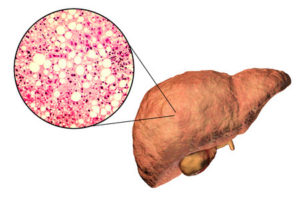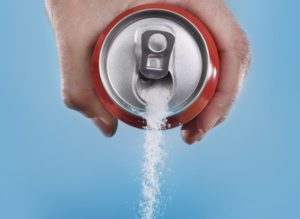
 Your liver is an amazing organ, performing over 400 different functions and internal processes, many of which help you live a healthy, happy, and productive life.
Your liver is an amazing organ, performing over 400 different functions and internal processes, many of which help you live a healthy, happy, and productive life.
It purifies your blood, keeps your skin, hair, and nails looking young, supports relaxation, aids in digestion, keeps your mind sharp, elevates your mood, and many other beneficial things.
And it does all that while actively eliminating dietary and environmental toxins that have built up in your body over time.
Liver and Weight Loss
One of the most important things your liver does is help you manage your weight…
- It regulates hormone production, specifically insulin. Insulin stabilizes your blood sugar levels. A damaged liver eventually becomes insulin resistant, leading your body to convert food directly into fat, and can lead to type 2 diabetes and heart disease.
- It manages metabolism and fat-burning. If your liver is operating at less than 100%, it will have trouble eliminating toxins, which can lead to inflammation, and the storage of extra fat, specifically in the hips, thighs, and love handles.
- It regulates your cholesterol levels. Not only can cholesterol harden your arteries and promote fatty internal organs, but it also affects your estrogen and testosterone levels, leading to increased belly fat and bloating.
 Once your liver-fat levels exceed 5%, the liver cells break down and essentially stop functioning. At that point, your normally high-functioning finds it difficult to perform anything at all, much less keep you at a healthy weight.
Once your liver-fat levels exceed 5%, the liver cells break down and essentially stop functioning. At that point, your normally high-functioning finds it difficult to perform anything at all, much less keep you at a healthy weight.
This could explain why past efforts to lose weight have not worked, regardless of how hard you tried. You were focusing on the wrong thing, your stomach, when you should have focused on your liver.
Happy Liver = Healthy Weight
For many people, when they get their livers into shape and operating at a high level of functionality, their bodies start naturally burning fat, and they no longer have trouble losing weight.
So how do you get your liver into shape? Here are 5 places to start…
1. Stop Drinking Alcohol

Of all the things you can do for your liver, taking a break from alcohol is one of the best. If your liver is compromised, or fatty, or if you have hepatitis, cirrhosis, diabetes, or scarring of any kind, alcohol is literally poison.
Even if your fatty liver is of the non-alcoholic variety, drinking can be dangerous because it directly reduces the functionality of the part of your liver that’s still healthy (the part keeping you alive).
Some people drink alcohol for years, possibly for decades, without any severe symptoms or signs there’s a problem. Then one night of particularly heavy bingeing takes their liver past the point of no return, and they start to physically feel ill. If that happens to you, pay attention.
2. Stop Eating Sugar, Sodas, And Processed Foods

Sugar and it’s evil twin, high-fructose corn syrup (HFCS), are directly responsible for fat buildup in your liver. They are almost as bad as alcohol.
Candy, soda, desserts, energy drinks, baked goods, and condiments (like ketchup) all contain sugar and HFCS, which not only damages your liver, but it harms your overall health and well-being, making you fat, and encourage diabetes.
But what you might not realize is that even salty foods like soup, crackers, salad dressings, and chips contain sugar and HFCS, which is why they are so addictive.
3. Clean Up Your Environment

When your environment contains toxins and poisons, your liver pays the price. This leads to lover and lung disease, and even brain damage, making it hard to function, much less reach and maintain a healthy body weight.
Avoid smog, polluted indoor air, chemicals, solvents, pesticides and herbicides. If you must be around them, make sure to use protective safety gear, and air-out your work area after you are done (and before you go back inside) so you aren’t exposed to anything dangerous.
4. De-Stress Your Life

Did you know that stress leads to inflammation in the human body? When your organs, glands, bones, muscles, ligaments and tissues become inflamed, you open up your body to the development of chronic disease.
This harmful stress can be mental or physical. Dealing with a stressful life situation can be just as harmful to your liver and other organs as the stress that’s caused from a physical injury, or a poor diet, or overuse of alcohol.
5. Embrace Movement

I don’t like the use the “E” word, instead we call it movement. You can join a gym, go swimming at your local community center, take a Yoga or dance class, or just do something as simple as walk around your neighborhood.
If you have a Smartphone, turn on your activity tracker and see if you can progressively walk a little further each day. Try to move for at least 2.5 hours each week, and I promise your liver will love it! Plus you’ll find its a lot easier to lose weight, and keep it off too.
What to do now?
If you ignore your liver, you’ll may experience massive and unexpected weight gain, as well as over a dozen other serious symptoms…
- Sluggishness and fatigue
- Mental fogginess
- Inability to get a good night’s sleep
- Abdominal pain
- Eczema and other skin issues
- Elevated cholesterol levels
- Depression, sadness, anxiety
- Patchy, dark areas on chest and back
- Soreness in back and shoulders
- Yellow eyes and jaundice
- Difficulty consuming alcohol
 Make a choice to eat fewer processed foods and more healthy, fresh fruits and vegetables. Clean up your environment, and cut out the stress in your life. Make sure you keep yourself physically active.
Make a choice to eat fewer processed foods and more healthy, fresh fruits and vegetables. Clean up your environment, and cut out the stress in your life. Make sure you keep yourself physically active.
Those 5 keys to liver health will help your body stay healthy, and naturally help you burn fat and excess body weight as well.
If you were diagnosed with fatty liver, pick up Reverse Your Fatty Liver, the only program specifically designed to help you naturally reverse your condition and heal your body.



its a pleasure to find the page and read more about fatty liver learn how to eat better
and to keep healthy . thamk you.